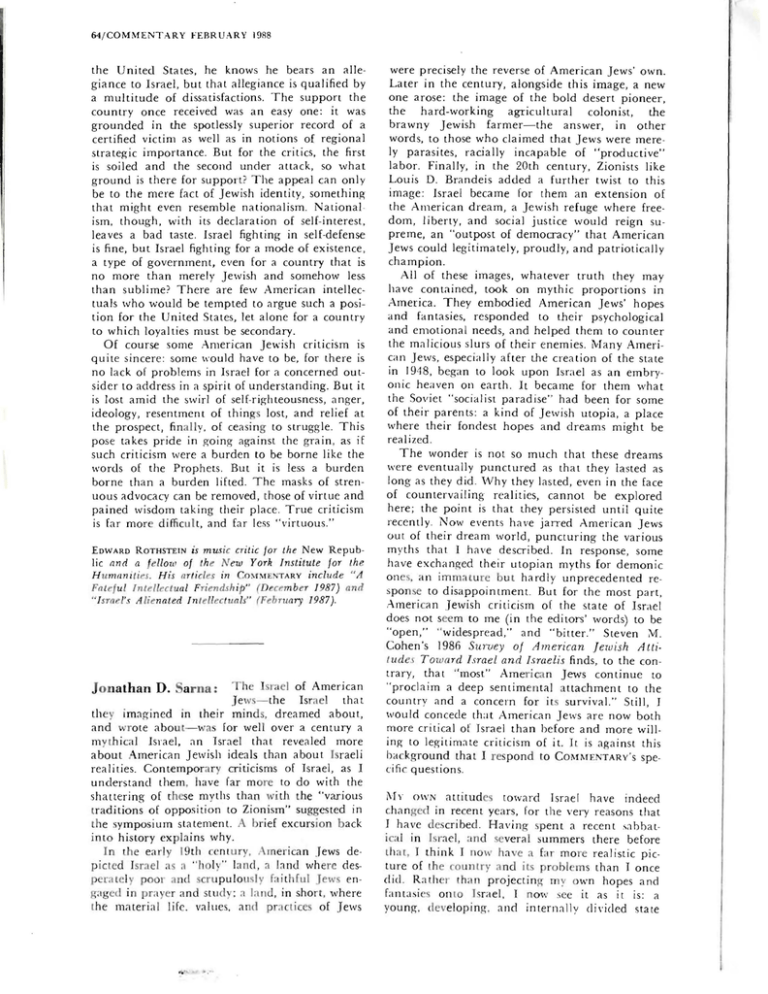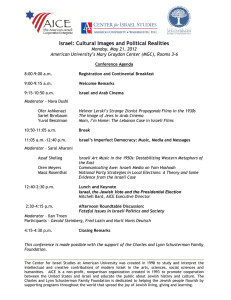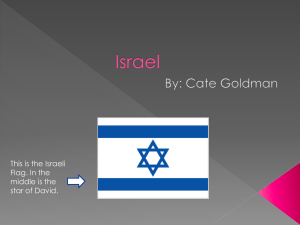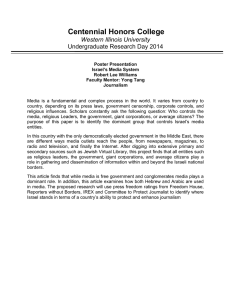the United States, he knows ... giance to Israel, but that ...
advertisement

64/COMMENTARY FEBRUARY 19f18 the United States, he knows he bears an allegiance to Israel, but that allegiance is qualified by a multitude of dissatisfactions. The suppOrt the country once received was an easy one: it was grounded in the spotlessly superior record of a certified victim as well as in notions of regional strategic importance. But for the critics, the first is soiled and the second under attack, so what ground is there for support? The appeal can only be to the mere fact of Jewish identity, something that might even resemble nationalism. National · ism, though, with its declaration of self-interest, lea ves a bad taste. Israel figh ting in self-defense is fine, but Israel fighting for a mode of existence, a type of government, even for a country that is no more than merely Jewish and somehow less than sublime? There are few American intellectuals who would be tempted to argue such a position for the United States, let alone for a country to which loyalties must be secondary. Of course some American Jewish criticism is Quite sincere: some would have to be, for there is no lack of problems in Israel for a concerned outsider to address in a spirit of understanding. But it is lost amid the swirl of self-righteousness, anger, ideology, resentment of things lost, and relief at the prospect, fin a ll y. of ceasing to struggle. This pose takes pride in going against the grain, as if such criticism were a burden to be borne like the words of the Prophets. But it is less a burden borne than a burden lifted. The masks of strenuous advocacy can be removed, those of virtue and pained wisdom taking their place. True criticism is far more diffic ul t, and far less "virtuous." is music crilic for the New Republic fInd a fel/ow of the N ew York Institute for the H I/ manl ties. His arlicles in Co~r~r EKTARY inclllde " A Fa tef ul Intellat ual Friendsh ip" (December 1987) and " Isra el's A lie nated In lellect ua ls" (February ]987). EDWARD ROTHSTEIN Jo nathan D. Sarna : T he Israel of American Je w - the Israel that th ey imagined in their mind s, dreamed about, and wrote abou t-was for well over a century a myt hical Israel, an Israel that revealed more about American Jewish ideals than about Israeli realities. Contempora ry criticisms of Israel, as I understand them, have far more to do wi th the shattering of these myths than with the "various traditions of opposition to Zionism" suggested in the symposium statement. A brief excursion back into history explains why. In the earl ' 19th cent ury , American Jews dep icted Israel a ' a " II Iv" la nd, a land whe re desp r;llcly poor and cr llpllio llsly fa it hful Jew engaged in pra er and stud ::l land , in short, where the milterial life. values. a ne! pr:1 clice of Jews were precisely the reverse of American Jews' own. Later in the century, alongside this image, a new one arose: the image of the bold desert pioneer, the hard-working agricultural colonist, the brawny Jewish farmer-the answer, in other words, to those who claimed that Jews were merely parasites, racially incapable of "productive" labor. Finally, in the 20th century, Zionists like Louis O. Brandeis added a further twist to this image: Israel became for them an extension of the American dream, a Jewish refuge where freedom, liberty, and social justice would reign supreme, an "outpost of democracy" that American Jews could legitimately, proudly, and patriotically champion. All of these images, whatever truth they may have contained, took on mythic proportions in America. They embodied American Jews' hopes and fantasies, responded to their psYchological and emotional needs, and helped them to counter the malicious slurs of their enemies. Many American Jews. especially after the creation of the state in 1948, began to look upon Israel as an embryonic heaven on earth. It became for them what the Soviet "socialist paradise" had been for some of their parents: a kind of Jewish utopia, a place where their fondest hopes and dreams might be realized. The wonder is not so much that these dreams were eventually punctured as that they lasted as long as they did. \Vhy they lasted, even in the face of countervailing realities, cannot be explored here; the point is that they persisted until quite recently. Now events have jarred American Jews out of their dream world, puncturing the various myths that I have described. In response, some have exchanged their utopian myths for demonic ones, an im ma tu re b u t hardly unprecedented respon se to disappointment. But for the most part, Ameri an Jewish criticism o( the state of Israel does not see m to me (in the edi tors' words) to be "open," " widespread ," and "bitter." Steven M. Cohen's 1986 Survey of American Jewish Auit ude To wa rd Israel and Israelis finds, to the contrary, that " most" America n Jews continue to "proclaim a deep sentimen tal a ttachment to the country and a concern for its survival." Still, J would concede that American Jews are now both more critical of Jsrael than before and more willing to legitimate criticism of it. Jt is against this ba ckground that I respond to COMMENTARY'S specific Questions. My O\\'l\' attitudes toward Israel have indeed changed in recent years, for the very reasons that I have described. Having spent a recent sabbatica l in Israe l, a nd several summers there before lhat, I think I no w ha ve a far more realistic picture of the co ulllry a nd its p ro bl ems than I once did. R;n her tha n projecting m y own hopes and LrntJsi es 0111 0 J rael, I now see it as it is: a young. d eveloping. and internally di\'ided state \.\II·fU(;-\:" jl··\\ S be,n by ,erious soci;t1. religious, political. Zinc! economic prohlems. SOllie of th ese problem, are not he ing add re, ed at ;111; oth e rs, in m y opinion . are being addres,ed poorly. I see Isr:\e l sta nding at a critic:t1 his LO ri ca l juncti n, and I am far [rom certain that it will follow what I consider to be the righ t pa th. But whatever path Isra el foll ows, I must emph asize that my a ttachm e nt s to it will remain unchanged , for they are bas ically familial ones. Isra elis. indeed a \\'hole range of Israeli s, form part of m y m ish poch e, literally and figurati vely. I may not always agree with them, but I do always love them. As I I N DICATED , ma ny of the hopes and drea ms of Israel's supp orters app eZi r to me to have ucc n un rea listic and utopian-n o more rea lizabl e than the starry-eyed vision s some Jewi sh immig-rants brought with thelll when they sa iled into Ellis Island . Such dreams, in the fin a l a na lysi s. tell liS far more abou t those who do the dreaming than those who are d reamed-about. D i a ppoin tments could have been anticipa ted . Ha ving said this, one should by no mea m overlook Israel' s astonishing accompli shme nts. Some how, despit all the many problems tha t we may now :l cknowledge. its cities boom and its deserts bloom. One need on ly visit Israel's neighbors, say Egvpt or Lebanon, to realize how remarkabl e the Zionist achievement has been. To my mind, the more important question is not whether Israel has fulfilled or disappointed our hopes, but whether it has fulfilled its own. The state of Israel, according to its 1948 Declaration of Independence, " . . . will be based on freedom. justice, and peace as envi saged by the prophets of Israel; it will ensure complete equality of social and political rights to all its inhabitants irrespec· tive of religion , race, or sex; [and) it will guaran tee freedom of religion, conscience, language, education, and culture." These goals, as anyone who has ever lived in Israel knows, have yet to be met. Some of Israel's leaders seem quite determined to make sure that they never will be. IN TRYING to evaluate recent criticisms of Israel by American Jews, I have been greatly influenced by the words of Rabbi Jonathan in the talmudic tractate of Tamid (28a): "He who reproves his neighbor with pure intent ['in the name of heaven'] is worthy of a portion from God ." Criticism, Rabbi Jonathan implies, must be carefully evaluated: much depends on the motives of the critic. The unworthy critics today are easy to find: their shrill voices are neither moderated by love nor tinged with sadness. The worthy critics are more scarce. Alive to Israel as it really is, their words mingle praise and reproof. They speak softly, almost fearfully, and always in pain. In ~. ' 1) I ~ R.-\F.L - .~ S\'.\!I'OSI1.\! / 65 tit is, l SI ;tel " forti eth Y',ll', I shall strain to h ea l l it III l>etter. .fO.' AT II ,\ ' I) . S ,\R :\.\ /J Ill ) cars n.tWclIllc p ro fe llo r of AIII " nc(ln f t:", i.~h h ls/o ry II I H eln ew "io rl Co lIl:gc-j r'fJJ il h I " J/ i 111//' of I clif!. io ll ll nd i, d i rn /or of i l s Cenl c r' fu r I}, e IlI rI )' o f I III' .1m n l Crt l/ j ew;.,,, E xper i ena . H i f moll r,'- ce n / book is T he .\ me ri can Jewish Experi ellce (Holm e, ~- .11 ein). Peter Shaw; first question prom pts a recogn itio n that I h ave experienced a diminuti on of dread over l~r a c l 's su rv iva l. as well as a d im in ut ion of distres over d e\-c1 opments that cause Israel a d verse publi ci ty. bra ]'s military strength and favorable den' lopJllcnts in til _ ra b wo rld see m to point the way to survi a l. Tlte Arab ta tes seek unity to heal the rifts bro ught a bout by the Iran-Iraq war, but their reslora tion of r lations with Egy p t a ppears to signal no t the old resolve to destroy Israel, b ut a promising ,\cceptance of the one state amo ng the m to h a ve sig ned a peace treaty with Israel. The recent demonstrations and riots in Gala and the \Vest Balik ha ve brought the Palestinian question to the fore as Israel's greatest problem. On the other hand, though it is said that the growing Israeli Arab population threatens the continu,Ince of a Jewish state, the two populations have relllailled stable relative to one another and there is reason to believe that they will continue to do so. Adve rse publicity about Israel in America has been largel y offset by a signi fican t change in the terms of discussion. Thanks to an emphasis on tile argument that Israel is America's one dependable ally in the Middle East, Israel is no longer the ward whose protection was urged on Americans as a moral responsibility. From this point of view, Israel's involvement in the Irancontra arms deal showed it to be the one country America could turn to for guidance through the maze of Middle Eastern intrigue. And if Israel failed, it was because of a similar lack of affinity for the game. More than ever, therefore, American public opinion views Israel not only as an ally but as an outpost of its own civilization_ In this light even the killings at Sabra and Shatila, misreported as they were so as to cast a portion of the guilt on Israel, ma y not have hurt it in the long run. For in th e context of subsequent Arab terrorism in Lebanon, the worst accusations against Israel appeared as possible temporary exceptions on Israel's part to the norms of Western behavior, in con trast to a rule of terroristic behavior on the part of the Arabs. Thus the American press, by worrying over Israeli morality while accepting Arab brutalities as givens, left a more favorable C O M M EN TARY's






